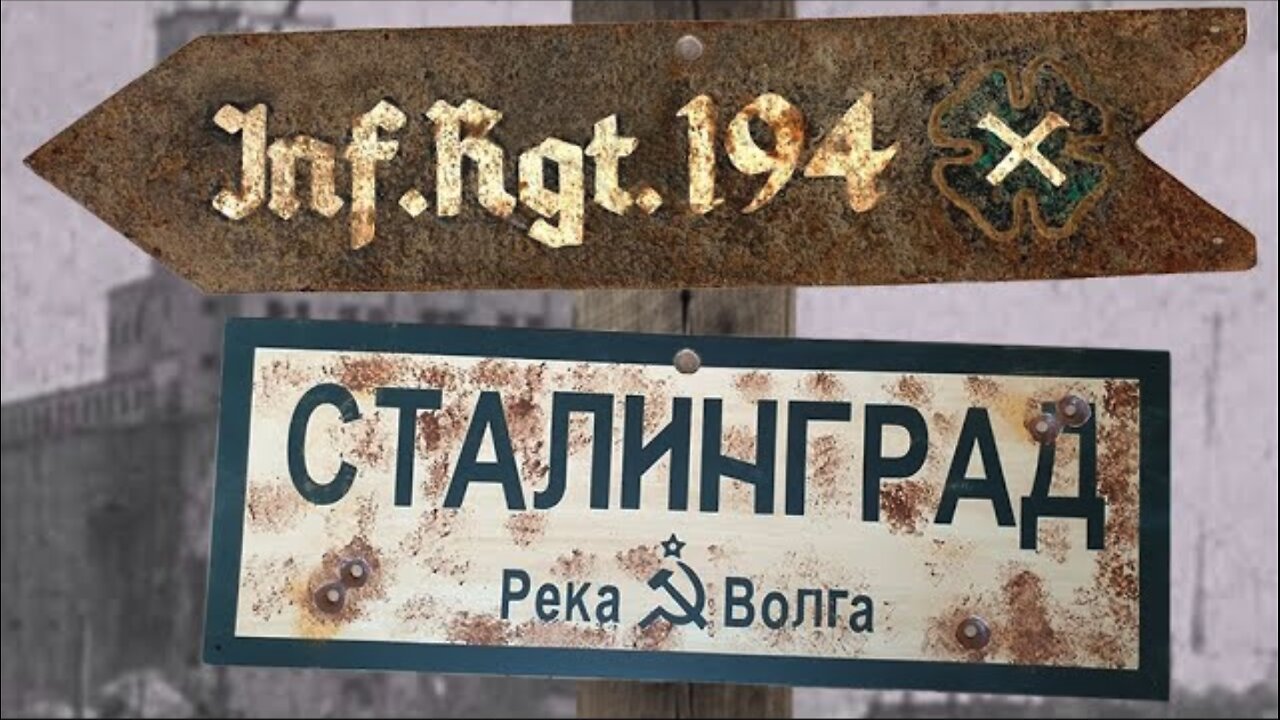Premium Only Content

Engaging Soviet snipers in trees 22.6.41 - 71st ID "Lucky Division" first division in Stalingrad Pt3
SUBSCRIBE
https://www.youtube.com/channel/UCN2UQVe6Xaqz5rLFaWq8-mw?sub_confirmation=1
Open a free account and see example exclusive footage on Military1945.com
The 71st would eventually be the first German division to move into Stalingrad. That’s also where it was completely wiped out.
But today we’ll start and then end on a macro level and see how the three infantry Regiments of the 71st, advanced on June 22, 1941. We’ll zoom in and follow Heinz’s personal experiences with the 194th during the rest of that fateful day.
On the morning of June 22, 1941 at 3:15 hrs the 71st ID’s three regiments the 194th, the 191st and the 211th advanced together without artillery preparation over the German-Russian border. The enemy was taken completely by surprise allowing Regiment 194 with the 2nd and 3rd Btls to occupy the street between Future and Dachnow without a fight. In the town just to the east however fierce street fighting broke out and the divisions first casualties of the campaign were taken. IR 194 continued east and took the rail connection to the north west of Lubaczow including the rail bridge across the Solotwa river intact. By 6:45 hrs the southern entrance to Lubascow was in the regiments hands.
We arrive to the city and there is nobody around. On a street corner we come across a baker’s cart loaded with freshly baked bread rolls that we hungrily devour. In the houses we see evidence of hasty departures. The drawers and wardrobes have been thrown open and most of the contents removed and carried away. Actually it’s a Polish city that was occupied by the Russians after the Polish campaign. Pictures of Stalin and all kinds of propaganda posters are hanging everywhere, pasted to the walls. The Regiment entered the city from three sides and met in the city square in front of the church.
Russian artillery continues firing on the city and our commander is hit in the cheek by a piece of shrapnel causing us to all take cover in the houses. The General appears and yells at the officers encouraging them to continue on. Staying close to walls for protection we make our way past burning houses, snapped and dangling telephone lines and dead horses. We reach a bridge that the Russian artillery gunners have concentrated their fire on and in between two shots we run across. The quick advance continues on through various burning towns.
In the meantime it’s already 1400 hrs and the day seems to be dragging on eternally. We pass through large corn fields and at various times come under enemy fire. It becomes evident that just a few snipers are able to hold up an entire company since we are really never sure how strong the enemy is.
In late afternoon we come under heavy enemy fire, much of which is seen to be coming from the trees. You have to give it to these snipers, it must take a lot of courage to do what they do. Rarely do they survive an engagement. The Russians also hit us with mortar fire but the shells land 100 m short and after about a half hour delay we are able to continue on.
Finally we hold up in a village, occupying houses and are able to wash ourselves. After 20 hours on our feet in the blazing heat we gladly collapse on benches and fall asleep. Tomorrow morning our unit is meant to take the second position in the continued advance. I only hope that we are not expected to move out quite as early.
Throughout the day of June 22 IR 194 was forced to halt its advance and destroy nests of enemy resistance. The well fortified army base situated just outside Lubaczow put up stiff resistance and not until late afternoon after using heavy infantry support weapons was it finally overrun by the 2nd Company.
As described by Heinz in his diary, the city of Lubaczow was occupied relatively quickly during the morning however the Soviet artillery continued pounding which resulted in Colonel Schmidt being badly injured. Major Gereke stepped in and took command. The divisional artillery was moved up and organized to the north of the city to counter the heavy enemy fire. Although effective, within the hour at almost the exact same location where Schmidt had been injured, the commander of Artillery Regiment 171 Colonel v. Rohr was fatally injured during another Soviet bombardment.
When the attack began on the morning of the 22nd, IR 191 quickly moved into Dachnow and after heavy street fighting had control at 500 hrs. Leaving a detachment just to the north of the city for security, the regiment continued east and by 600 hrs had managed to cross the Solotwa river. In the forest area to the east IR 191 also did battle with snipers in trees.
In the early morning IR 211 attacked the border fortress to the south west of Czeresnic. Defenders in the city put up little resistance but those in a castle just to the east, being led by a woman, put up a fight. Only after sustained concentrated flak fire were the defenders silenced. From the afternoon on IR 211 served to secure the northern flank of the 71. ID.
-
 8:22
8:22
Military1945
8 days agoStalingrad Private Footage Pt 2 + 71st Infantry Div 22.6.1941 Pt 2, Army Group South, War in Ukraine
1032 -
 7:36
7:36
Colion Noir
3 hours agoDonald Trump Issues Executive Order To Protect The Second Amendment
25.3K27 -
 13:39
13:39
Exploring With Nug
9 hours ago $1.66 earnedCars Found Underwater While Searching Georgia Woman!
21.5K1 -
 56:50
56:50
IsaacButterfield
1 day ago $4.21 earnedSam Kerr Goes To Jail | Americas Worst Law | Teacher Of The Year
34.6K14 -
 6:14
6:14
Silver Dragons
1 day agoAmerican Silver Eagle Coins - Dealer Reveals Everything You NEED to Know
36.7K7 -
 19:18
19:18
Neil McCoy-Ward
1 day ago🚨 The USAID Scandal Goes Way Deeper Than We Could Have Imagined!
40.7K26 -
 14:29
14:29
Bearing
11 hours agoTHE BIG BALLS EFFECT - Democrats MELT DOWN Over DOGE & USAID 🔥
30.3K71 -
 11:35
11:35
China Uncensored
1 day agoChina Nuclear Fusion Breakthrough Shocks The World
58.8K42 -
 50:19
50:19
AlaskanBallistics
20 hours ago $1.77 earnedI Love This Gun Podcast Episode 6
40.4K -
 16:35
16:35
DEADBUGsays
1 day agoPolice Stories Ep4
28.7K